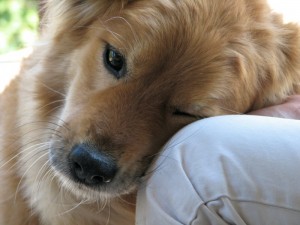 I acted the devil’s advocate. “So here we are, driving to the animal shelter to volunteer when people are hungry. Shouldn’t we be helping at the Food Bank?” I grinned so she knew I was playing a bit.
I acted the devil’s advocate. “So here we are, driving to the animal shelter to volunteer when people are hungry. Shouldn’t we be helping at the Food Bank?” I grinned so she knew I was playing a bit.
Reprinted with permission from CatholicSistas.com.
She pursed her sassy, fourteen-year-old lips and dodged. “Well, you can go there with one of the boys.” She has five brothers. “I want to walk the dogs and help people find their perfect pets.” Fair enough. We marched in and donned our aprons and name tags.
My daughter and I volunteered for the first time a few weeks ago at our local animal shelter. (I am not allowed to call it the pound.) We exercised and goofed off with three dogs, tested to see if they knew any commands, cleaned up after them, wrote down our observations in the special notebook, and stacked some dishes. Then, joy of joys, we assisted a couple with the adoption of one of the dogs we’d taken out that very morning.
My girl was able to explain just what she’d done, how the dog responded, and because she reads so much about dogs, to describe what she knew of the breeds that made up the adorable mutt. The world seemed a little sweeter on the drive home and our conversation was as cheerful as any I have ever known. I was sorry I had dragged my feet in scheduling time there. It was a good day.
And I am not a dog person. I deal with the three dogs we have at home because my husband and this daughter of ours love them. But I have learned to see the goodness that pets bring to lives, both in terms of practical responsibilities that parents relish in child raising, and in terms of existential connections that humans cherish in creation. I cannot yell at our dogs because one of them gets nervous and tinkles on the floor. See? Good for home life, too.
I was surprised at the peaceful delight in my soul after our hours at the shelter. I felt close to my daughter, my community, and my Lord. Of course, it helped that the staff (and dogs!) were friendly and appreciative and that we were able to actually aid an adoption our first day. It affected me deeply.
Stimulated by our excellent conversation and experience at the shelter, I poured through our catechism for support and theology. The Catechism of the Catholic Church is “offered to every individual who asks us to give an account of the hope that is in us and … to know what the Catholic Church believes” (from the introduction). I found several paragraphs to share with my daughter.
“Animals, like plants and inanimate beings, are by nature destined for the common good of past, present, and future humanity. Man’s dominion over living beings granted by the Creator is not absolute; it is limited by concern for the quality of life of his neighbor, including generations to come; it requires a religious respect for the integrity of creation.”
“Animals are God’s creatures. He surrounds them with his providential care. By their mere existence they bless him and give him glory. Thus men owe them kindness. We should recall the gentleness with which saints like Saint Francis of Assisi or Saint Philip Neri treated animals (# 2415-16).”
My daughter hustled off to look up Philip Neri, whom she had never heard of.
“Human work proceeds directly from persons created in the image of God and called to prolong the work of creation by subduing the earth, both with and for one another. . . Work honors the Creator’s gifts and the talents received from him. . .” (#2427).
My daughter’s work with these animals and the people who happily bring them home is good. She is helping to raise the quality of life for her neighbors and respecting the integrity of creation by actively aiding these dogs kindly and gently and connecting people with prospective pets. She is using her gifts and talents in all her human dignity.
God is pleased with her work and I am honored to toil beside her in our town. It doesn’t have to be either/or between people and animals. It can be both/and. We volunteer away some of our food and we volunteer away some of our time at the shelter. People are blessed. The world is a little better. God is glorified and creation is respected.
When Jesus was asked what the greatest commandment was (Matthew 22:36-40), He answered, “Love the Lord your God with all your heart, with all your soul, and with all your mind.” And then, “Love your neighbor as yourself.” We do love God and His love moves us to action. By volunteering at the animal shelter, we are putting love of neighbor back into our community. I am actually looking forward to our next morning there.



